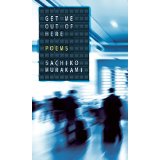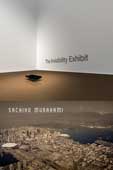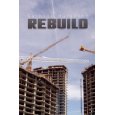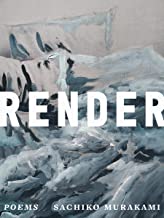Sachiko Murakami was born in Vancouver. She completed an M.A. degree in creative writing at Concordia University in Montreal in 2006. The poems that comprised her thesis were published in 2008 as The Invisibility Exhibit. Murakami currently resides in Toronto.

Poetry
Get Me Out of Here
Toronto: Talonbooks, 2015.
PS8625 .U72 G48 2015
Publisher’s Synopsis (From its website)
Ma misses the sun, warmth and colors of their faraway homeland, but her daughter sees magic in everything — the clouds in the winter sky, the “firework” display when she throws an armful of snow into the air, making snow angels, tasting snowflakes. And in the end, her joy is contagious. Home is where family is, after all.
Why is it often so difficult to stay present in the moment? Poet Sachiko Murakami asked this question in an open call on the Internet, and in airports across the globe, from YVR (Vancouver) to RKV (Reykjavik), people in transit stopped to note in only one sentence their impressions of things, events, people, and feelings. The poems that result from this experiment in crowd-sourcing content search departures and arrivals for a handhold on the fleeting present. Working within and wriggling out of the formal constraint of fourteen lines, Get Me Out of Here explores what poems need to do to stay when the mind is begging to leave.

Poetry
The Invisibility Exhibit
Toronto: Talonbooks, 2008.
PS8626 .U72 I68 2008
Publisher’s Synopsis (From its website)
Ma misses the sun, warmth and colors of their faraway homeland, but her daughter sees magic in everything — the clouds in the winter sky, the “firework” display when she throws an armful of snow into the air, making snow angels, tasting snowflakes. And in the end, her joy is contagious. Home is where family is, after all.
These poems were written in the political and emotional wake of the “Missing Women” of Vancouver’s Downtown Eastside. …
As the title suggests, the concern of this project is an investigation of the troubled relationship between this specific marginalized neighbourhood, its “invisible” populations both past and present, and the wealthy, healthy city that surrounds it. These poems interrogate the comfortable distance from which the public consumes the sensationalist news story by turning their focus toward the normative audience, the equally invisible public. …
Awards and Honours
2008 Governor General’s Literary Awards–Poetry (English) (Finalist)
2009 Gerald Lampert Memorial Award (League of Canadian Poets) (Finalist)

Poetry
Rebuild
Toronto: Talonbooks, 2011.
PS8626 .U72 R43 2011
Publisher’s Synopsis (From its website)
Ma misses the sun, warmth and colors of their faraway homeland, but her daughter sees magic in everything — the clouds in the winter sky, the “firework” display when she throws an armful of snow into the air, making snow angels, tasting snowflakes. And in the end, her joy is contagious. Home is where family is, after all.
In a city ironically famous for its natural setting, the roving subject’s gaze naturally turns upward, past the condo towers which frame the protected “view corridors” at the heart of Vancouver’s municipally- guaranteed development plan. But look for the city, and one encounters “a kind of standing wave of historical vertigo, where nothing ever stops or grounds one’s feet in free-fall.”
Murakami approaches the urban centre through its inhabitants’ greatest passion: real estate, where the drive to own is coupled with the practice of tearing down and rebuilding. Like Dubai, where the marina looks remarkably like False Creek, Vancouver has become as much a city of cranes and excavation sites as it is of ocean and landscape. Rebuild engraves itself on the absence at the city’s centre, with its vacant civic square and its bulldozed public spaces. The poems crumble in the time it takes to turn the page, words flaking from the line like the rain-damaged stucco of a leaky condominium.

Poetry
Render
Vancouver: Arsenal Pulp Press, 2020.
E-book (Access restricted to members of the TMU community)
Publisher’s Synopsis (From its website)
Ma misses the sun, warmth and colors of their faraway homeland, but her daughter sees magic in everything — the clouds in the winter sky, the “firework” display when she throws an armful of snow into the air, making snow angels, tasting snowflakes. And in the end, her joy is contagious. Home is where family is, after all.
A recovery narrative has a known form: what it was like, what happened, and what it’s like today. In a poem, what can be arranged or interpreted with such certainty, by whom, and to what end? What is the relationship of the performance of recovery via a poem to the truth of the experience? Does one deliver the other? Insert into these considerations the experience of traumas. How is trauma converted by post-trauma experiences? What is the retribution of that experience when articulated as poetry? Enter these questions through the dream, with its unrenderable subjects, landscapes, and plots. Where do dreams meet poetry in their spontaneous, opaque, necessary structures? What do such comparisons yield to the waking reader? What can be rendered intelligible in the soup of long-term recovery?
Awards and Honours
2020 Governor General’s Literary Award–Poetry, English language (Finalist)
Selected Criticism and Interpretation
Ballantyne, Emily. “Rearticulate, Renovate, Rebuild: Sachiko Murakami’s Architectural Poetics of Community.” In Public Poetics: Critical Issues in Canadian Poetry and Poetics, edited by Bart Vautour, Erin Wunker, Travis V. Mason, and Christl Verduyn. Waterloo: Wilfrid Laurier University Press, 2015, 177-198.
PS8155.1 .P82 2015
Chan, Sunny. “Consensual Hallucinations: Cyberspace, Narrative, and Poetics in Asian North American Literature.” Master’s thesis, University of British Columbia, 2012.
Available as an open access thesis from the University of British Columbia.